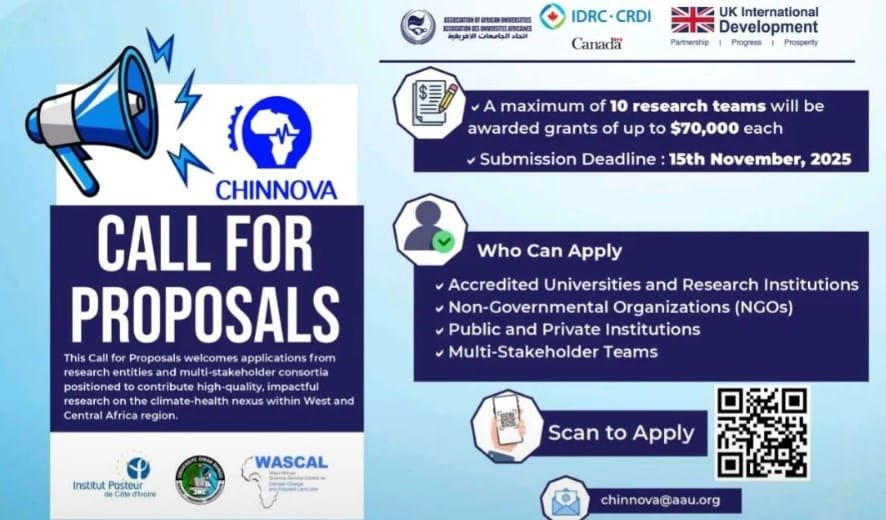Applications are open for Climate Change and Health Innovation Hub for West and Central Africa (CHINNOVA) Small Grants. The Climate Change And Health Innovation Hub For West And Central Africa (CHINNOVA) is led by the Association of African Universities (AAU) in Partnership with the West African Science Service Centre on Climate Change and Adapted Land Use (WASCAL), Institut Pasteur de la Cote d’Ivoire (IPCI) and the Omar Bongo University (UOB). CHINNOVA seeks to establish, manage and support a cohort of networked researchers in West and Central Africa.
Funded by the International Development Research Centre (IDRC) and the Foreign, Commonwealth & Development Office (FCDO) of the United Kingdom, CHINNOVA aims to foster collaboration among African researchers, policymakers, and communities to co-develop solutions that advance climate-resilient health systems.
The CHINNOVA project invites applications from eligible research teams and institutions to undertake innovative, interdisciplinary research on the nexus between climate change and health. The call seeks to generate robust evidence and strengthen research capacity to inform policies and interventions addressing the health impacts of climate change in Africa.
CHINNOVA Small Grants Objectives
This Call for Proposals seeks to:
- Generate robust, contextually relevant evidence on the interactions between climate change and health in West and Central Africa.
- Pilot and evaluate innovative solutions to enhance climate resilience, health system adaptation, and community well-being.
- Strengthen the capacity of African research institutions and their partners to lead and sustain climate-health research agendas.
- Build collaboration across sectors, disciplines and countries to create knowledge, accelerate learning and scale-up effective approaches.
Research Questions and Priority Areas
Proposals must address one or more of the priority research questions identified through CHINNOVA’s stakeholder consultations in the region. The following thematic areas are prioritized:
- Health Systems Preparedness and Response
- How can health systems anticipate and adapt to climate shocks (e.g., heatwaves, floods, droughts, dusts, etc.)?
- What tools and approaches can improve health emergency preparedness and response capacity?
- Interoperable Climate-Health Data Systems
- What innovative tools and standards can be developed to ensure the generation of high-quality, disaggregated, and interoperable climate and health data?
- How can data findability, accessibility, interoperability, and reusability (FAIR) be improved for climate-health evidence-based research and interventions?
- Climate-sensitive Diseases and Health Outcomes
- How are climate variability and change influencing the distribution, seasonality, and burden of vector-borne and water-borne diseases, including, but not limited to malaria, dengue, and cholera?
- What interventions can strengthen surveillance and control of vector- and water-borne diseases in the context of climate change?
- Gender, Equality, and Vulnerable Populations
- How do climate-health risks affect women, children, the elderly, people with disabilities, and marginalised groups?
- What interventions can reduce gender and social inequities in climate-health vulnerability?
- How do social determinants such as socio-economic status, gender, and geographic disparities influence community vulnerability and adaptive capacity to climate-related health risks in West and Central Africa?
- Climate Information Services and Early Warning and Response Systems
- How can climate information be integrated into health decision-making and early action?
- What are effective models of community engagement, early warning and response systems, and risk communication?
- Policy and Institutional Innovations
- What policy instruments, innovative multisectoral response mechanisms, and incentive structures can promote the integration of climate-health considerations into training curricula for both climate and primary healthcare workers?
CHINNOVA Small Grants Funding Details
- All sub-grants will be subject to sufficient funds being made available to CHINNOVA by IDRC & UK FCDO under the partnership agreements between AAU and the other partners.
- Through this funding opportunity, 8-10 proposals will be funded to conduct research in West and Central Africa.
- Total funding available is up to USD 700,000.00 and the maximum funding request per project is USD 70,000.00.
Eligibility Criteria
- This Call for Proposals welcomes applications from research entities and multistakeholder consortia positioned to contribute high-quality, impactful research on the climate-health nexus within West and Central Africa region.
- Applicants must be based in or have active collaborations within the countries indicated under the eligible countries below.
Geographic Coverage
- This Call targets projects to be implemented in one or more of the following West and Central African countries: Benin, Cameroon, Chad, Cape Verde, Côte d’Ivoire, Democratic Republic of Congo, Equatorial Guinea, Gabon, The Gambia, Ghana, Guinea, Guinea-Bissau, Liberia, Mauritania, Sao Tome and Principe, Senegal, Sierra Leone, Togo.
Eligible entities include:
- Research Institutions and universities actively conducting climate-health related research.
- Multi-stakeholder research teams from research entities, non-governmental organizations (NGOs), civil society organizations and private sector partners.
- Multi-country applications are allowed but the research team must ensure the scope is clear and adequately budgeted.
How To Apply for CHINNOVA Small Grants
- Interested organizations are kindly invited to submit their Expression of Interest by completing the online form available through this link
- Click Here for more details
Application Deadline: 15 November, 2025
Elevate Your Business With Our Expert Services!







